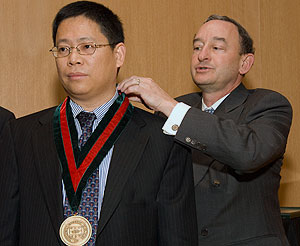Younan Xia, Ph.D., professor of biomedical engineering, was installed as the inaugural James M. McKelvey Professor in the School of Engineering & Applied Science in a Sept. 2 ceremony in Uncas A. Whitaker Hall.
The McKelvey professorship is named in honor of the school’s dean from 1964-1991 and is one of three professorships established in 2003 by a gift from the JSM Charitable Trust and from John F. McDonnell to support the Center for Materials Innovation (CMI).

CMI is a community of Washington University scholars whose work extends beyond discipline boundaries to enhance intellectual opportunities and research options. It operates as a catalyst to bring together students and faculty in the College of Arts & Sciences, the School of Engineering & Applied Science and the School of Medicine.
“Washington University is fortunate to have an abundance of great friends, and among the most notable of these is John McDonnell,” Chancellor Mark S. Wrighton said. “His support for endowed professorships encourages leading faculty to be engaged in the interdisciplinary research of the Center for Materials Innovation. This extraordinary gift to the center demonstrates his strong commitment to the great promise for advancing materials research at Washington University.”
Widely recognized as one of the world’s preeminent material scientists, Xia has authored more than 300 scholarly articles and holds 10 patents. Among his most distinguished awards are fellowships from the Alfred P. Sloan Foundation and the David and Lucile Packard Foundation and the NIH Director’s Pioneer Award in 2006. He serves on the advisory boards for Nano Research, Nano Today, Langmuir, International Journal of Nanoscience, International Journal of Nanotechnology and Advanced Functional Materials. Xia also is an associate editor of Nano Letters.
Xia and his research group are pursuing cutting-edge research in nanotechnology, materials chemistry and biomaterials. More specifically, they are working on the development of a new class of materials with sizes lesser than 100 nanometers to create innovative technologies, with the ultimate goal of building a scientific base for large-scale production of nanomaterials. These nanomaterials will have major applications in areas such as electronics, photonics, catalysis, information storage, optical sensing and biomedical research.
Xia joined the WUSTL faculty in 2007 with a home appointment in biomedical engineering. Additional appointments are in energy, environmental and chemical engineering in the School of Engineering & Applied Science; chemistry in Arts & Sciences; and biochemistry and molecular biophysics and radiology in the School of Medicine. He also has an appointment in the Division of Biological and Biomedical Sciences.
“Our school is honored three-fold by this professorship,” said Salvatore P. Sutera, Ph.D., interim dean of the School of Engineering & Applied Science and senior professor of biomedical engineering.
“Professor Xia is a renowned scientist; Jim McKelvey led the school to national prominence in engineering research and education; and John McDonnell shaped one of the greatest aerospace companies in the world,” he said. “I’m very proud to have these three remarkable persons associated with the School of Engineering.”
McKelvey earned a master’s and a doctoral degree in chemical engineering from Washington University in 1952. After a career in industry with DuPont, he began his academic career in 1954 at Johns Hopkins University. He returned to WUSTL in 1957, was named chair of the Department of Chemical Engineering in 1962, and, in 1964, embarked on a 27-year tenure as dean of the engineering school.
Although officially retired since 1996 after 39 years of service, McKelvey continued teaching in the chemical engineering department through the 2007-08 academic year.
Under his leadership, the school rose to national prominence in engineering education. McKelvey was responsible for many innovations, including the Engineers’ Scholarship Program, the Dual Degree Program and the Cooperative Education Program. In addition, he is known for being an early pioneer in the field of polymer processing.
McDonnell is the retired chairman of McDonnell Douglas Corp. After earning bachelor’s and master’s degrees in aeronautical engineering from Princeton University, he joined McDonnell Douglas in 1962. He led the company through the early 1990s and retired in 1997 after overseeing its merger with Boeing to create the world’s largest aerospace company.
McDonnell’s long and distinguished relationship with the University began in 1976 as a member of the Board of Trustees. Since then, he has served in many leadership positions, including his current one as vice chair. He also was founding chair of the Arts & Sciences National Council and now serves on the School of Engineering & Applied Science’s National Council. He and his wife, Anne, are Life Members of the William Greenleaf Eliot Society and Sustaining Charter Members of the Society’s Danforth Circle.
John McDonnell and the McDonnell family, with their associated foundations, are committed supporters of the University whose generosity extends throughout the Danforth Campus and School of Medicine Campus.
In addition to their strong support for professorships, they have given substantially for scholarships, academic initiatives and buildings at WUSTL.
In 2005, McDonnell and the Trust made a $10 million gift to establish the McDonnell International Scholars Academy, creating a global network of partner universities and providing scholars with undergraduate degrees from those institutions the opportunity to earn a graduate degree and experience broad leadership exposure at the University.
Over time, it is anticipated that the graduate scholars will form a network of leaders around the world in many countries and fields of endeavor.